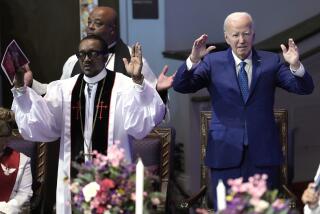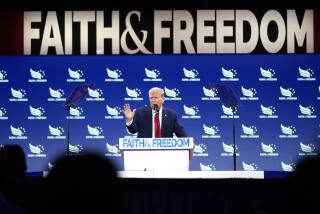Bush to Seek More Funding for Faith-Based Charities
WASHINGTON — Embracing an old cause to open a new front in his outreach to African American church leaders, President Bush pledged Monday to pressure corporate foundations to give more money to faith-based charities.
Bush made that promise during a closed-door session at the White House with 17 black ministers and civic leaders -- his second such meeting since January.
His pledge marked a return to an issue that he first raised in May 2001, when he told a commencement audience at the University of Notre Dame: “The federal government will not discriminate against faith-based organizations, and neither should corporate America.”
That initiative lapsed amid the Sept. 11 attacks, corporate scandals and turmoil in the White House’s faith-based office. But it has been revived as Republican strategists began focusing on the fact that such an issue could greatly appeal to black voters.
The White House plans to sponsor a March summit that officials said would bring together corporate foundation leaders and faith-based social service organizations, many of which are affiliated with black churches.
Administration officials said they would focus attention on major foundations with policies limiting or forbidding donations to religious charities. Those include foundations run by Ford Motor Co., General Motors Corp., IBM Corp., Exxon Mobil Corp. and Citigroup, according to each foundation’s website.
“I think we can all understand their reluctance, just as we see within government a reluctance to fund a faith-based organization because you don’t want money to go to preaching or proselytizing,” said Jim Towey, director of the White House Office of Faith-Based and Community Initiatives, who arranged Monday’s meeting.
Towey noted that many faith-based groups had separate accounts -- one for strictly religious activities and one for social services -- so that “the corporate or foundation or government money can go to the social service itself” and not the religious component.
But, he added, “while we have removed barriers [on donations to faith-based groups] at the federal level, within corporate boardrooms and foundation boardrooms, there are still barriers in place.”
The focus on corporate giving mirrors the administration’s bid to increase government grants to religious social service agencies. That effort, which included opening faith-based offices in at least 10 agencies, including the Labor Department and the Department of Housing and Urban Development, was credited last year with helping Bush make political inroads with black preachers in battleground states who, in turn, helped increase the president’s share of the vote among African Americans.
Although Bush has had some success in redirecting government dollars and shifting the debate about the line between church and state, he may find corporations a harder sell. Companies are loath to risk alienating customers by wading into topics as emotional as religion.
Many companies give to groups such as Habitat for Humanity and the Salvation Army, which have religious components but are considered credible charities. Experts said corporate foundations tended to adhere to strict guidelines, giving only to established groups and benign causes such as education and the arts.
“They are relatively agnostic, for lack of a better word,” said Stephen Jordan, executive director of the U.S. Chamber of Commerce Center for Corporate Citizenship.
The website of the IBM foundation, for instance, says it does not support “individuals, political, labor, religious, or fraternal organizations or sports groups.” The Ford Motor Co. Fund, run by the automaker and not affiliated with the Ford Foundation, prohibits contributions to “religious or sectarian programs for religious purposes.”
Others, such as Exxon Mobil, prohibit donations to “religious causes.” The Citigroup foundation lists restrictions on religious charities, but notes that exceptions can be made if the organizations “are engaged in a significant project benefiting the entire community.”
Although Bush had raised the issue four years ago, Monday’s pledge came in a new context, with heightened attention by the White House to working with African American religious leaders. Republican strategists believe that the ministers are a promising portal into overwhelmingly Democratic voters. Black pastors were credited with increasing Bush’s share of the black vote from 9% in 2000 to 11% last year -- and with helping rack up substantially higher gains in key states such as Ohio, Michigan and Florida.
One pastor at the White House on Monday said Bush’s pledge would force corporate executives to consider questions of race as they distribute millions of dollars in donations designed to boost companies’ images.
“This is all about whether white corporations become rational corporate citizens when it comes to black Americans, who are lagging behind all social groups,” said the Rev. Eugene Rivers, who heads a church and charity in Boston.
Monday’s meeting was not explicitly political, but was attended by Karl Rove, Bush’s chief political strategist and architect of the GOP plan to cement a long-lasting conservative majority in the party by courting sympathetic minority voters.
Also attending was Secretary of State Condoleezza Rice, who briefed the ministers on her recent trip to Africa. In May, Rice hosted about two dozen black ministers to discuss ways to increase funding to black faith-based groups doing relief work in Africa.
Monday’s session followed criticism last month from several black ministers that Bush had not done enough to increase funding to fight HIV in Africa.
But in a letter to Bush that Rivers delivered Monday, some of the same clerics wrote to “vigorously applaud” the administration’s Africa policy, including White House efforts at the recent G-8 summit in Scotland that led to debt relief for African nations.
More to Read
Sign up for Essential California
The most important California stories and recommendations in your inbox every morning.
You may occasionally receive promotional content from the Los Angeles Times.










